I'm trying to get all of my Mac's IP addresses (IPv4 + IPv6) but am not seeing the results I expect. I'm using code from this Stack Overflow post to get an array of all IP addresses, but there's an IP address missing.
I'm using another Mac to share it's internet connection and create a NAT64 network per Apple's documentation for testing/supporting IPv6 networks.
For example here's what the System Preferences → Network pane says my IP address is:
... but I see that I actually have two IPv6 addresses upon further inspection:
... but only one of these is returned:
"169.254.38.213",
"2001:2:0:aab1:d0ef:646d:f22a:5d83",
"127.0.0.1"
... when using this:
#include <ifaddrs.h>
#include <arpa/inet.h>
#include <net/if.h>
@interface AppDelegate ()
#define IP_ADDR_IPv4 @"ipv4"
#define IP_ADDR_IPv6 @"ipv6"
@end
@implementation AppDelegate
- (void) applicationDidFinishLaunching: (NSNotification *) aNotification
{
NSMutableDictionary *addresses = [NSMutableDictionary dictionaryWithCapacity:8];
NSMutableArray *ipAddressesArray = [[NSMutableArray alloc] init];
// retrieve the current interfaces - returns 0 on success
struct ifaddrs *interfaces;
if (!getifaddrs(&interfaces))
{
// Loop through linked list of interfaces
struct ifaddrs *interface;
for (interface=interfaces; interface; interface=interface->ifa_next)
{
if (!(interface->ifa_flags & IFF_UP) /* || (interface->ifa_flags & IFF_LOOPBACK) */)
{
continue; // deeply nested code harder to read
}
const struct sockaddr_in *addr = (const struct sockaddr_in*)interface->ifa_addr;
char addrBuf[ MAX(INET_ADDRSTRLEN, INET6_ADDRSTRLEN) ];
if (addr && (addr->sin_family==AF_INET || addr->sin_family==AF_INET6))
{
NSString *name = [NSString stringWithUTF8String:interface->ifa_name];
NSString *type;
if (addr->sin_family == AF_INET)
{
if (inet_ntop(AF_INET, &addr->sin_addr, addrBuf, INET_ADDRSTRLEN))
{
type = IP_ADDR_IPv4;
}
}
else
{
const struct sockaddr_in6 *addr6 = (const struct sockaddr_in6*)interface->ifa_addr;
if (inet_ntop(AF_INET6, &addr6->sin6_addr, addrBuf, INET6_ADDRSTRLEN))
{
type = IP_ADDR_IPv6;
}
}
if (type)
{
NSString *key = [NSString stringWithFormat:@"%@/%@", name, type];
addresses[key] = [NSString stringWithUTF8String:addrBuf];
}
}
}
for (id key in addresses)
{
if (![[addresses valueForKey:key] hasPrefix:@"fe80"])
{
[ipAddressesArray addObject:[addresses valueForKey:key]];
}
}
// Free memory
freeifaddrs(interfaces);
}
NSLog(@"%@", ipAddressesArray);
}
Any idea what is going on here? Does it matter? I'm trying to execute some other code conditionally based on IP address matching. It'd be one thing if the only IPv6 address returned was the one displayed to the user in System Preferences when first opening the Network pane, but instead the only IPv6 address returned is the "hidden" one that you have to dig into the Advanced... section to find. Thank you in advance.

